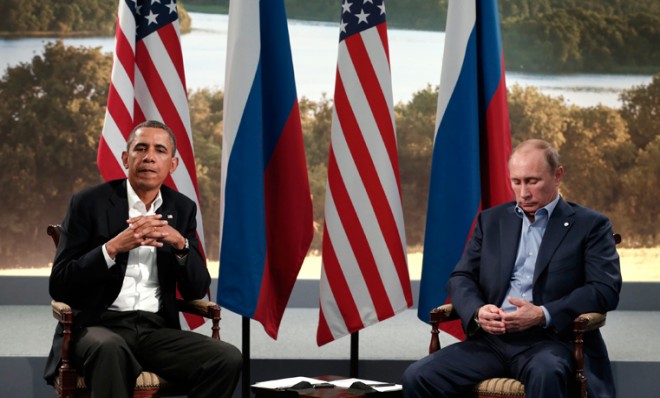How Russia views Obama's snub of Vladimir Putin
The decision to cancel face-to-face meetings is getting mixed reviews


A free daily email with the biggest news stories of the day – and the best features from TheWeek.com
You are now subscribed
Your newsletter sign-up was successful
This week President Obama canceled planned one-on-one meetings with Russian President Vladimir Putin, which had been scheduled to coincide with the G-20 summit in St. Petersburg in September. The White House cited a lack of progress on a whole host of bilateral issues, from arms control to human rights, plus Russia's "disappointing decision" to grant NSA leaker Edward Snowden political asylum.
The decision to snub Putin hasn't really hurt Obama at home. Jay Leno, incensed over Russia's crackdown on gays and lesbians, seemed to approve of the decision in an interview with Obama, and even some Republicans guardedly lauded the move. But how is the brush-off playing in Russia?
Pretty quietly. Yuri Ushakov, Putin's foreign affairs adviser, said the Kremlin is "disappointed" with Obama's decision. The snub is "clearly linked to the situation" with Snowden, "which hasn't been created by us," he added. In fact, it's the Americans who "have avoided signing an extradition agreement" with Russia for years now. "The U.S. is still not ready to build relations on an equitable basis," Ushakov said, adding that the invitation to bilateral talks is still open.
The Week
Escape your echo chamber. Get the facts behind the news, plus analysis from multiple perspectives.

Sign up for The Week's Free Newsletters
From our morning news briefing to a weekly Good News Newsletter, get the best of The Week delivered directly to your inbox.
From our morning news briefing to a weekly Good News Newsletter, get the best of The Week delivered directly to your inbox.
Ushakov's statement aside, "the Russian reaction was perhaps most clear in the way that Vesti, the state's main propaganda TV channel, conveyed it on the channel's website," says Simon Shuster at TIME. "Buried about half way down on the page, underneath a story about Russian tourists in Turkey, Vesti announced: 'The invitation for Obama stands.'" The news that Obama decided not to meet with Putin "was clearly not something the official spin doctors wanted to advertise," Shuster says.
After a year spent honing their anti-American rhetoric... the Kremlin message makers were suddenly eager to claim that President Vladimir Putin didn't really mean for things to go this far. "Sure, Putin uses this rhetoric, but it's not so much anti-American as anti-Euro-Atlantic," says Evgeny Minchenko, a Kremlin-connected political strategist. "And keep in mind that he has tried to stop short of a head-on collision." But a head-on collision is what Putin got, and he has very little to show for it. [TIME]
Outside of Russia's official sphere, reaction was more colorful.
"This is not the first time that Moscow has been disappointed by the largely unilateral self-serving decisions of Washington," says John Robles at The Voice of Russia. "Such snubs have been almost par for the course since the end of the Cold War." On the other hand, "leaving the door open has been the Russian stance on everything from Syria to the American's ABM system, but surely there will have to come a day when that door will have to be closed securely, that is my own opinion, but there is a point when disregard and disrespect will reach and unforgivable levels."
In all honesty Obama should have been grateful at the graciousness and respect and intelligence and forward thinking of President Vladimir Putin in agreeing to speak with him at all, especially after the recent insults to Russia by the United States due to the Snowden affair. That the respected and intelligent leader of the largest country in the world would grant an audience to the leader of the country in the world with the biggest guns and who continues to run roughshod over the international community is something that they in the U.S. should be grateful for. But of course they are living in their Mickey Mouse, Faux News, Guantanamo is good, Ministry of Truth fantasy world and do not see the reality of U.S. policy. [Voice of Russia]
Putin's critics in Russia are divided on the snub, Shuster reports. Garry Kasparov, the former chess master turned anti-Putin organizer, is a fan: "Putin thrives on these joint appearances to show his cronies that he's an equal on the global stage despite his lack of credentials, and that he can protect their interests abroad," Kasparov said. "I'm glad Obama is finally showing some spine with regard to Putin."
A free daily email with the biggest news stories of the day – and the best features from TheWeek.com
Leonid Gozman, a liberal politician, argued that Obama could have done more good than harm by visiting Moscow. "He could at least have met with activists, spoken at a university, explained his message in an interview to the Russian press," Gozman said. "Back in 1972, our country was like a concentration camp without fences, and Nixon still came to meet Brezhnev. They ended up talking through their problems. Everybody won."
Arguably, nobody wins here. Obama's "reset" with Russia is set back, and Putin gains nothing and possibly loses face. Obama at least gets some credit domestically for making a stand, so if there's a relative winner, it's probably the American president. And it appears both sides see it that way, too.
Peter has worked as a news and culture writer and editor at The Week since the site's launch in 2008. He covers politics, world affairs, religion and cultural currents. His journalism career began as a copy editor at a financial newswire and has included editorial positions at The New York Times Magazine, Facts on File, and Oregon State University.
